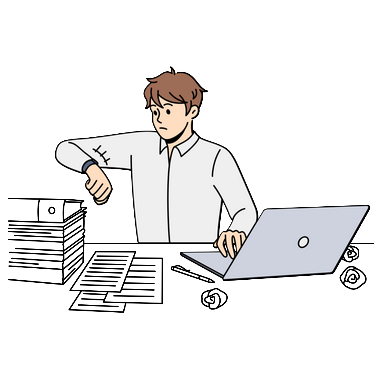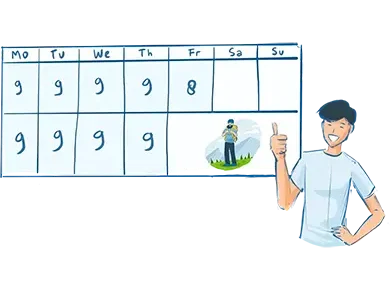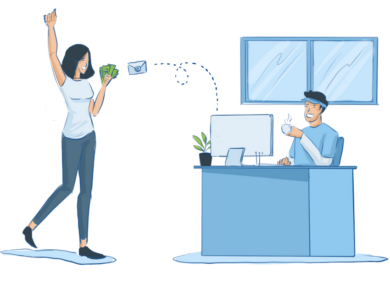Overworked is such a common feeling among people with a growth mindset. And it really doesn’t matter if you are employed by a company or a self-employed professional. For sure, everyone wants to get as many results as possible in the shortest time.
We all want to meet our goals, achieve our dreams, and prosper to all intents and purposes. Moreover, we want to do this quickly.
Therefore, we all know what that implies. Sometimes we work harder than we thought humanly possible.
We’ll focus on accomplishing everything we set out to do and, almost without realizing it, we are working too much. Like this, sometimes we may work way too long-hours, or maybe we work too hard.
How do you get to feel overworked
a) As a self-employed
In this case, you have the opportunity to set your schedule and work at your own pace. At the same time, your motivation to do as many things as possible is very strong. For these reasons, you’ll often try to do more than is possible and at one point you’ll get to feel overworked. Some of the things that can bring you to this situation are:
Overloading daily agenda
Definitely, you want to do a lot of things but the day has 24 hours and not even an extra minute. Even though it may seem hard, try to plan only as much as you can achieve in a day. Above all, the fact that you overload your to-do list can have a negative psychological impact. As a result, you risk feeling overworked from the very beginning and this will not help you perform better.
Setting unrealistic deadlines
If you know that for a certain activity you need a certain amount of time, then plan at least that much. Moreover, you can set aside a time margin between activities. This way, you won’t have to give up quality in favor of quantity. Usually, if you do things in a hurry just to finish within the set interval, the quality may suffer.
Trying to do too many things at once
Certainly, multitasking is not the best way to do more. On the contrary, doing one thing at a time will give you much better results. That’s because you’ll be able to focus all your attention on that. This way, you will not have to spend extra time later checking what you did or eventually redoing errors.
Not respecting what you’ve planned
Yes, you have to be flexible with your plans. But, only in case of need. Instead, if you keep thinking and rethinking about the things you have to do, you will only be wasting your time. Make your plans in advance and analyze them carefully. After that, start working and respect what you set out to do.
Spending too many hours at your workplace.
In addition to professional activities, you must also take your personal life into account. Certainly, both are as important to you as they are to all of us. Especially that an imbalance between the two does not bring anything good in any respect. On the contrary, it may even hold you back.
b) As an employee
In this case, there is a possibility that your responsibilities may take a long time. Or, maybe the employer is asking you for more than you can do during the normal schedule. Of course, it is normal to want to get things done. Therefore, occasional overtime may be justified. But it is important that this happens only occasionally and does not become routine.
Unfortunately, most of the time in reality things are different.
It’s good to be a hard worker, but working too hard is not necessarily a very good thing. Especially since the negative effects of feeling overworked are quite strong and can affect you both physically and mentally.
On one hand, excessive professional involvement can lead to the loss of the boundaries between work and private life. And, most of the time the private time loses ground in favor of your working hours. Therefore, difficult situations may arise in relationships with your loved ones. As a result, all these become stressful at some point and this strongly influences one’s productivity. And not in a good way.
On the other hand, personal problems can also affect professional performance. For example, suppose you are constantly concerned about personal issues. In this case, you will not be able to focus on what you need to work on. Therefore, productivity will decrease significantly.
In conclusion, in both cases, you will have to make extra efforts to compensate for the lack of productivity. As a result, you will become overworked and the negative effects of this will be felt soon.
With that in mind, let’s imagine that we draw the line at one point. Also, let’s pretend that you’ve got what you wanted and achieved your goal. Then think about the price you paid for it and conclude if it was worth it.
Which are the negative effects and how it affects you
Being overworked can affect you in many ways. Mental, physical, and emotional negative effects may appear. These are interconnected and all together will cause chain reactions in your body and your life.
The stress and exhaustion that occurs when you are overworked can cause many and various problems. Among these are included: attention problems, sleep disorders, depression, diabetes, impaired memory, and even heart diseases or strokes.
The influence that all these have on our efficiency and productivity is certainly not desirable. On the contrary, we get the exact opposite:
- The lack of attention increases the incidence of accidents
- A poor memory makes you forget important things
- Difficulties in concentration will make deadlines difficult to meet
- Depression drastically decreases your creativity and your livelihood
- The lack of communication makes collaboration difficult
- Increased fatigue can lead to heart disease or even strokes
This is not something you need, and it will not help you to reach your goals faster or easier.
On the contrary, in the long term, feeling overworked will hinder you in this process.
How to avoid becoming overworked
It is understandable that you are passionate about your work. Also that you want to make your business thrive. Even more, it is absolutely normal that you want to perform well both in your personal and professional life. Just keep in mind that you need to keep a good balance between these two, to perform well. Also, make sure you do all this without getting overworked.
Here are some steps that will help you in this regard:
Plan your weekly activities the previous weekend
This way, you will have time to analyze everything carefully and put them exactly in the desired order. Also, you will start the week knowing exactly what to do. Therefore, you will not waste time first thing Monday morning, trying to decide what to do.
Make a To-do list for the next day the night before
Overnight your subconscious can help you with some solutions. Moreover, you will start the next day determined and relaxed because you will know exactly what you are going to do.
Estimate as accurately as possible the time required to complete each activity
Based on previous experiences, you will be able to make these estimates more accurate each time. More than that, if you are using a time-tracking solution, then it will be very easy to do so.
Only schedule as many activities as you know you will be able to accomplish
It is worth mentioning once again that overloading your To-do list does not lead to anything good.
Keep time available for any unforeseen events
It would be advisable to reserve some margins between activities where possible. This way, an unforeseen situation will not turn upside-down your whole schedule.
Set aside time for relaxation and movement
Sport and relaxation are essential to increase productivity. Therefore, no matter how busy your schedule is, always make time for yourself and your health.
Track your time to make sure you stick to your plans and don’t overdo it
When you are passionate about what you do, it is very easy to lose track of time. But, this fact can negatively influence your daily schedule. Make sure you avoid such situations.
Be flexible with your plans and adjust them as needed
Of course, unforeseen situations can occur. Or maybe situations that require your immediate attention. In this case, adjust your plans. But, as much as possible, try to respect them.
With a well-planned and organized way of working you can have high productivity and you don’t risk feeling overworked. The steps above are within anyone’s reach, are easy to apply, and have proven efficiency.
How to recover if you already feeling overworked
If you realize that you already feel overworked, then take immediate action. It’s important to lower the negative effects and to get back on track. In addition, if you act early, it will not be very difficult to get results quickly.
- First of all, try to take a break, relax, and rest. Then, start practicing some sport, something that you like and enjoy doing. From the start, this will help you feel better.
- Make sure you get enough rest. Use this Sleep calculator to see how many hours of sleep are recommended for you and when. It even helps you include an afternoon nap in your daily schedule.
- Then, you may analyze how you work and how you spend your time. To do this, use a time-tracking program. Or, maybe even a Time management solution. It will help you see what your time management flaws are so that you can take the necessary measures.
- Rethink how you allocate time on different tasks. Also, plan your activities and keep track of your time. That way, you always have control over what you do with your time.
- You will work more relaxed knowing exactly what to do both in the present moment and next. This way you will be able to reach your goals and make your business thrive. And that, of course, in the shortest time possible.






